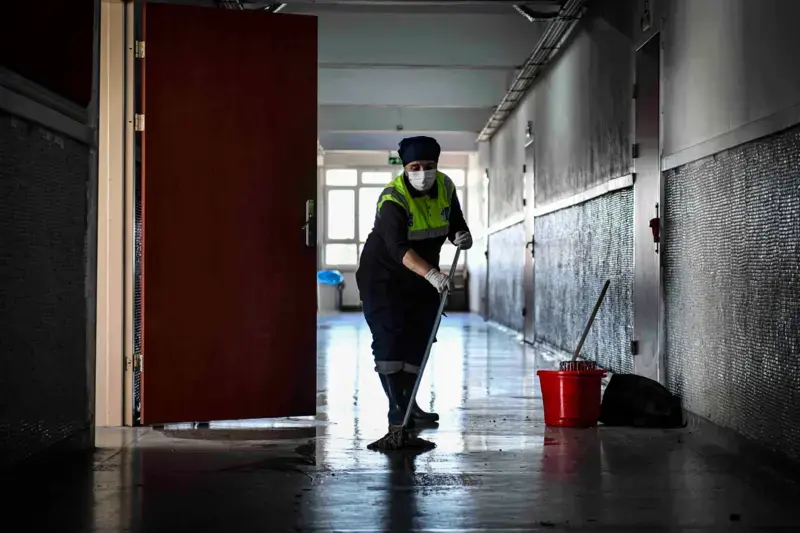The new academic year in Turkey has kicked off with reports of cleanliness and hygiene issues at public schools, prompting a public debate.
Since the start of the school year on Sep 9, many schools have struggled with a lack of cleaning personnel and materials. In some cases, teachers and even parents have stepped in to clean classrooms themselves. Images of dusty, dirty, and partially renovated classrooms have circulated in the media, along with reports that basic hygiene supplies such as soap and toilet paper were missing in some schools.
Some parents have claimed that school administrations have asked them for financial assistance to cover the costs of cleaning staff and supplies.
The Turkish Education and Science Workers' Union (Eğitim Sen) voiced concerns over the potential health risks posed to students, calling for the hiring of more permanent staff. “The lack of adequate cleaning services negatively impacts both students’ health and the morale of education workers,” the union said in a statement. “Cleanliness is essential for the quality of education and should not be an area of cost-cutting.”
Ministry of Education responds to concerns
In response to the concerns, the Education Ministry announced on Sep 30 that 30,000 new staff members had been assigned to schools. The ministry cited delays in recruitment as the main cause of the hygiene problems, noting that staffing shortages were due to insufficient applications to a government-run employment program.
According to the ministry, 63,777 temporary workers have already been employed under the program, and an additional 30,000 personnel have begun work as of the end of September. The ministry also stated that approximately 8,000 staff members are tasked with monitoring cleanliness and hygiene conditions in schools.
Municipalities step in to assist schools
Amid growing public complaints, local municipalities have also become involved in cleaning efforts at schools. The mayor of Ankara, Mansur Yavaş, announced that the city had provided cleaning services to 48 schools so far, responding to requests from school administrators. However, Yavaş claimed that some schools withdrew their requests after being warned by Education Ministry officials not to seek assistance from the municipality.
Yavaş remarked, “When the media showed the poor conditions in the schools, we stepped in immediately. So far, 925 schools have requested hygiene materials from us, and we’ve supplied 232 of them. We’ll fulfill the rest by the end of the week, unless they refuse further assistance.”
Video coverage of Ankara municipal workers cleaning schools:
‘Temiz Okul, Sağlıklı Gelecek’ projemizle; okullarımıza ücretsiz temin ettiğimiz temizlik malzemelerinin yanında, her hafta sonu mesai arkadaşlarımızla okullarımızı temizlemeyi hedefliyoruz.
— Ankara Büyükşehir (@ankarabbld) September 27, 2024
📺 NOW TV - 27 EYLÜL 2024 pic.twitter.com/01kGpJZu7J
Yavaş also noted that the Ankara Metropolitan Municipality had been supporting schools with cleaning and maintenance services since 2019, providing 154 million Turkish lira in aid over the past five years.
İstanbul Mayor Ekrem İmamoğlu also launched a cleaning initiative. On Oct 2, the municipality began a "Clean School Project," deploying mobile cleaning teams to 180 schools each week, prioritizing institutions with the most urgent needs.
Ministry criticism of municipalities
The Education Ministry criticized the involvement of municipalities, accusing some of exploiting the issue for political purposes. The ministry stated that isolated cases of unclean schools were being used for "manipulation" and "political showmanship."
“It is unethical to clean only a handful of schools for a single day and then claim that the cleaning of all schools in an entire city is being taken care of,” the ministry said in a written statement. It added that schools are "places of education, not political battlegrounds."
The ministry emphasized that any political activity in schools would not be tolerated, urging everyone to respect the integrity of educational institutions.
Staffing shortages and budget constraints
The staffing shortages in schools appear to be linked to a new employment program implemented by the Turkish Employment Agency (İŞKUR). Under the program, temporary staff can only work up to three days a week, earning a daily wage of 566.73 Turkish lira, which amounts to about half the minimum wage. The relatively low pay is believed to have contributed to the shortage of applicants.
Meanwhile, critics have suggested that budgetary constraints imposed by a government austerity plan, signed by President Recep Tayyip Erdoğan in May, may have further complicated the situation. Some opposition figures, such as Deniz Yücel, spokesperson for the Republican People's Party (CHP), have accused the government of risking public health by failing to adequately staff schools.
Despite these challenges, the Education Ministry insists that all necessary measures are being taken to resolve the situation and ensure that schools remain safe and hygienic for students. (VK)






